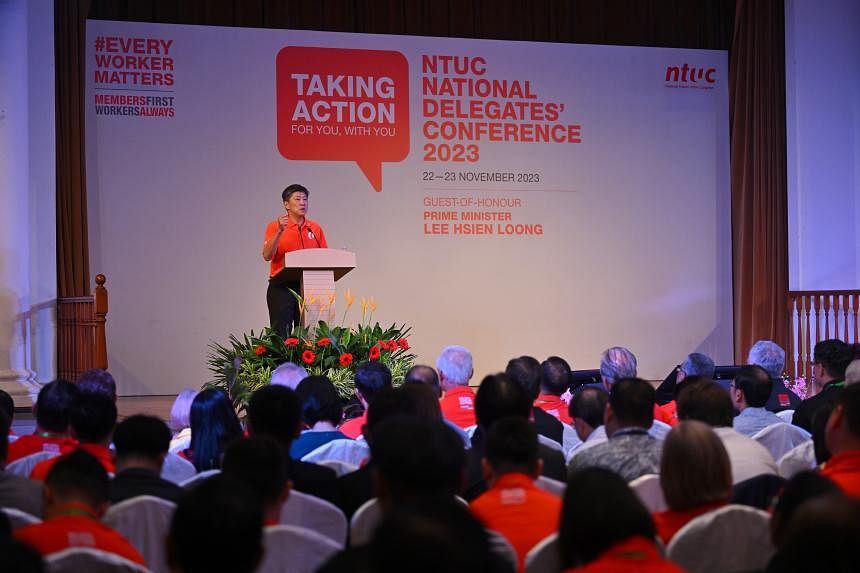SINGAPORE – The labour movement will push to represent more professionals, managers and executives (PMEs) and groom them for union leadership alongside rank-and-file workers, as it responds to changes in the make-up of Singapore’s workforce.
It will also get unions in the same industry to work closer together in clusters in the next four years as it moves to advocate wage, welfare and job prospects of more members innovatively, said labour chief Ng Chee Meng on Nov 22.
These changes are needed so unions stay relevant, as the share of PMEs plus technicians that make up Singapore’s workforce has already grown to 60 per cent, said Mr Ng, while presenting his report of NTUC’s work in the last four years at the National Delegates’ Conference. This is up from 30 per cent in the early 1990s.
The National Trades Union Congress (NTUC) elects a new central committee and charts out the direction the committee will take in its four-year term during the quadrennial conference. The 2023 conference is under way from Nov 22 to Nov 23 at Orchid Country Club.
Mr Ng said: “Our traditional union turf boundaries have served the labour movement well, with clear delineation of union boundaries so that we can operate in the allocated spaces.”
However, these boundaries also “silo our efforts to serve workers” and prevent innovations that could allow the labour movement to “create value, (increase) our relevance and capture value”, he said.
He added that working as industry clusters could allow unions to form broader networks, share resources and “hunt together as a pack” to bring in new members beyond the current reach of individual unions.
He also said clusters could partner with employers and the Government to explore unified training programmes and broader collective agreements.
To cement a culture of innovation, he said NTUC will set up an Innovation Lab that will survey ideas from elsewhere globally to apply to NTUC’s context. This includes partnerships with academia, the Government, employers and expert agencies such as the Institute for Human Resource Professionals, among others, to think of and test potential solutions to both immediate and longer-term problems.
“This will be an important capability that, if developed well, can not only allow NTUC to respond to challenges, but, importantly, proactively anticipate and seize new opportunities that will positively impact our workers,” said Mr Ng.
He then spoke on leadership renewal, which he deemed NTUC’s most important task from 2023 to 2027. He said leaders in the movement are ageing, while fewer younger members are stepping forward for leadership roles.
To counter this and appoint the right blend of younger leaders with dynamism and fresh ideas alongside veteran leaders with experience and practical wisdom, the labour movement will have to redouble its efforts to recruit, develop and groom leaders, he added.
Moreover, leaders need to be equipped with knowledge beyond the traditional scope of industrial relations and collective bargaining to encompass other areas such as personal data protection, workplace safety and health, and workplace fairness.
Mr Ng also provided other updates in his presentation, including on the labour movement’s membership growth.
He noted that NTUC’s membership is expected to reach 1.27 million by the end of 2023, marking a 30 per cent growth since the previous conference in 2019, and putting it in good stead to reach the 2030 goal of 1.5 million members the labour movement has set for itself.
He also said a total of 120 business transformation projects from 94 companies have been approved to receive the Company Training Committee Grant in its first year of implementation.
Companies can apply to NTUC’s Employment and Employability Institute for the grant to cover up to 70 per cent of qualifying cost of projects to raise productivity, redesign jobs and upskill workers.
Mr Ng previously said on Nov 16, ahead of the conference, that 84 grant recipients pledged additional pay rises, averaging 5.2 per cent for almost 1,500 workers, on top of the workers’ annual increment.
The $100 million scheme was launched in August 2022.
Mr Ng also thanked the outgoing central committee for its work, including NTUC president Mary Liew and vice-president Ong Hwee Liang, who will step down from their roles.


